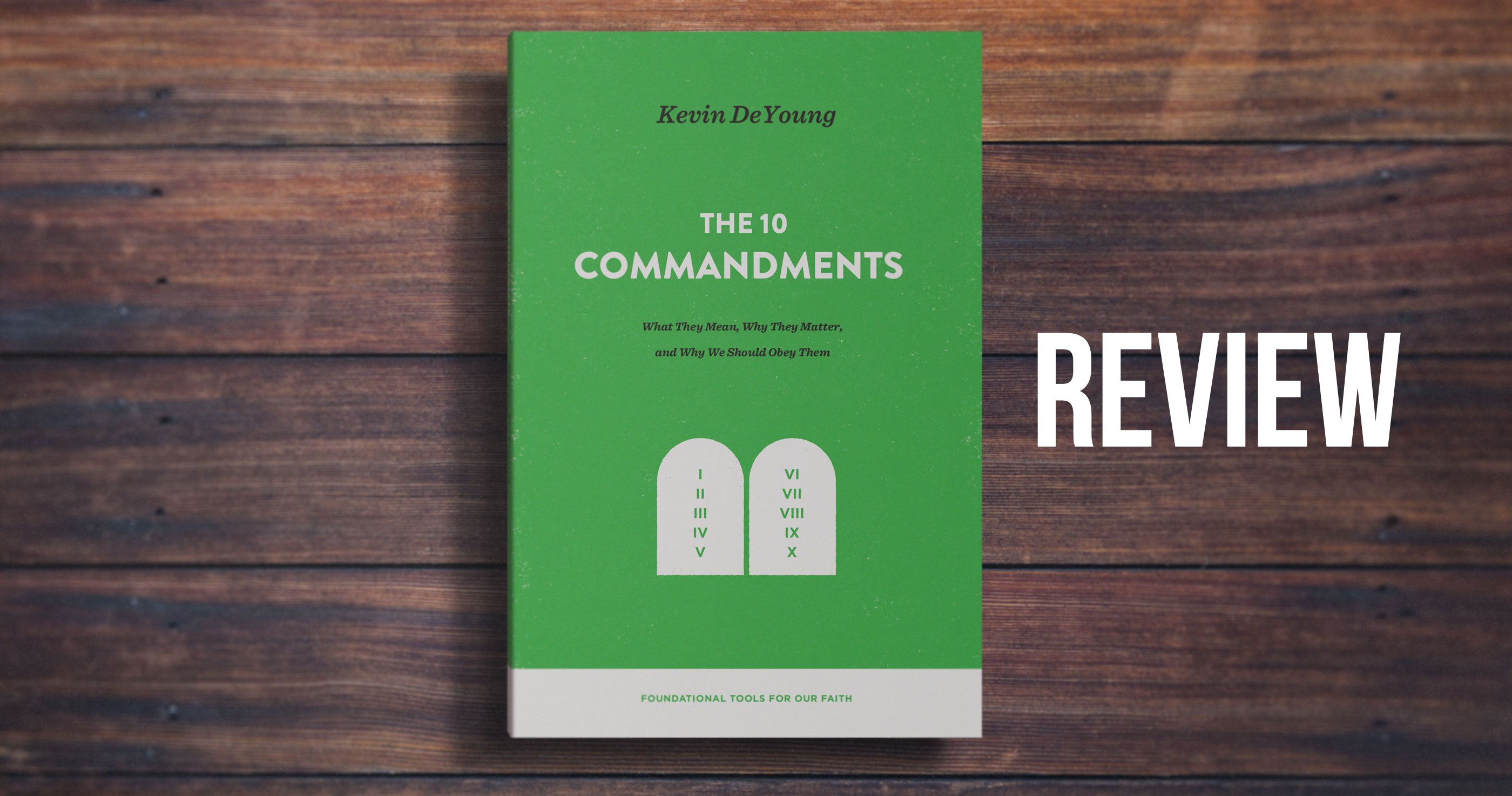Kevin DeYoung has written a number of accessible level books for lay-people in the church. From topics of busyness, to holiness, to how do we find God’s will, these books have helped the church grapple with difficult areas of doctrine for today.
In his latest book on the Ten Commandments, DeYoung sets out to explain what they mean, why they matter, and why we should obey them.
Coming from a different view to the author, I was interested to read this book and see if his arguments were convincing. So let’s see if he manages to answer those three questions in this book.
What They Mean

Throughout the book Kevin explains what the different ‘words’ mean in the decalogue. He explains them from a Jewish perspective; what each would have meant to the original reader and how they would have been implemented.
From there, DeYoung turns to how Christ has ‘deepened and transformed’ the commands. He does a good job at showing how each commandment points forward to Him.
He did tend to rely a lot on the Heidelberg Catechism for getting the meaning, which felt a little removed from the text. Of course, the catechism has ‘proof texts’ for what it says, but it would have been good to use those instead. For those from a non-confessional (or don’t realise they are confessional) position, like many in the UK, this may seem weird.
At some points he explains what different views are on what the commandments mean, but does this primarily from a Presbyterian context. Having a Lutheran, Anglican, or Baptist view may have opened the book up to a wider audience.
So in terms of answering the question ‘what they mean’, I’d say yes, he does answer it. But from a particular perspective.
Why They Matter

From there, the author turns to ask why the commandments matter. He does again a good job at explaining this from the Israelite perspective. He makes a good case that the Ten Commandments are ‘like the constitution for Israel’. This does appear to be the point of the narrative in Exodus, with the 10 words given to Israel being like the 10 words that God used to create everything.
He was also strong in showing that they all matter because they all teach us something about love for God and neighbour. As the New Testament tells us, all of Scripture is useful for teaching, so it is good to pick that up.
When explaining how this is translated to members of the New Covenant, DeYoung says: “When a piece of music is transposed, the melody stays the same, but it’s played in a different octave or a different key. That’s sort of how the Ten Commandments change from the Old Testament to the New. It’s the same score, different key. These commandments are still commandments for the church, but they have all been transposed by the coming of Christ.”
I would have liked a more thought out explanation of that idea. Kevin basically says that Jesus kept the 10 commandments, so we should. The danger with that though is remembering the timeframe Jesus lived in. He was born under the law to save those under the law (Gal 4:4). He also said that Paul endorsed them as a way for God’s people to love each other. “When we love, we fulfill the commandments, and when we obey the commandments, we are fulfilling the law of love.” Paul seems to be suggesting that love is the fulfilment of the law, not that they’re interchangeable – again something I’d have liked more on (for example, Brian Rosner’s Paul and the Law seems to suggest otherwise).
So, in terms of this question, he answers the question strongly for the Israelite context, but I would have liked some more to allow them to be eternal (e.g. when were they introduced, how all God’s words are useful for today).
Why We Should Obey Them

Moving onto the final question, DeYoung starts his book by introducing the 10 commandments as ’Ten Words that God wants all of us to follow’. He then continues this idea by stating that each command ’calls us’ to do something. The understanding seems to be that these commandments are applicable to all people at all times. From my reading of Romans 3, Galatians 3 and Hebrews 7, this does not appear to be as simple as that, so I would have liked a bit more explanation from the text.
Primarily, Kevin lists 5 main reasons why we should obey the 10 commandments today. The first of these is ‘who we are’. His argument is that the Israelites are a kingdom of priests and a holy nation, the same as Christians are today (1 Pet). The gist being that, in order to be holy, we should live God’s way (which in this case is by the 10 C’s). Strangely, the idea that the commandments were given to people saved from Egypt (as the introduction to them says) did not appear at this point. I would have appreciated that to be thrashed out, since, in context, Christians today are not rescued from Egypt, so there is an apparent discontinuity there.
His second point is ‘who God is in himself’. This point is strong – DeYoung says ‘the law is an expression of the Lawgiver’s heart and character’. Amen. Although, in the Lord Jesus we see the Father (John 14:9), so the argument could be made that Jesus fulfils the 10 commandments in that way.
Reason three is ‘who God is to us’. Here the author helpfully reminds us that God gives us commands for our good. It is common in our world today to think that commands are inherently bad – meaning to oppress us.
This point rolls into his 4th reason – ‘where we are’. DeYoung argues that the 10 commandments are not ‘instructions to get us out of Egypt. They are rules for a free people to stay free’. Again, the argument for how we get from laws given to a nation rescued from Egypt to today was missing here.
Finally, the last reason is ‘what He has done’. We are reminded here that the commandments follow the gospel. The Bible is not advocating a view of ‘do to be saved’, but instead says ‘done, so you can do’. This is something that does need addressing in a world that thinks we must work to be saved.
So in summary, DeYoung makes some good correctives to our approach to God’s law in this question, which I am thankful for. However, I am not sure he makes as concrete a case as I would have liked for why everyone should obey them. Perhaps I am looking for a higher level book than what is here, but I feel with the recent debates in evangelical circles, this should at least have been mentioned (or further reading provided).
Perhaps, if this receives a second edition, some Q&A could be added to the back (similar to Schreiner’s 40 questions on the law). I think it would help bolster the points made in this book.
I would recommend this book to those looking for an introduction to the Reformed (presbyterian) view on the purpose of the 10 Commandments for today, but would also recommend picking up some others at the same time (perhaps Sinai and the Saints).
Thanks to Crossway for letting me have a preview of this book for reviewing.



